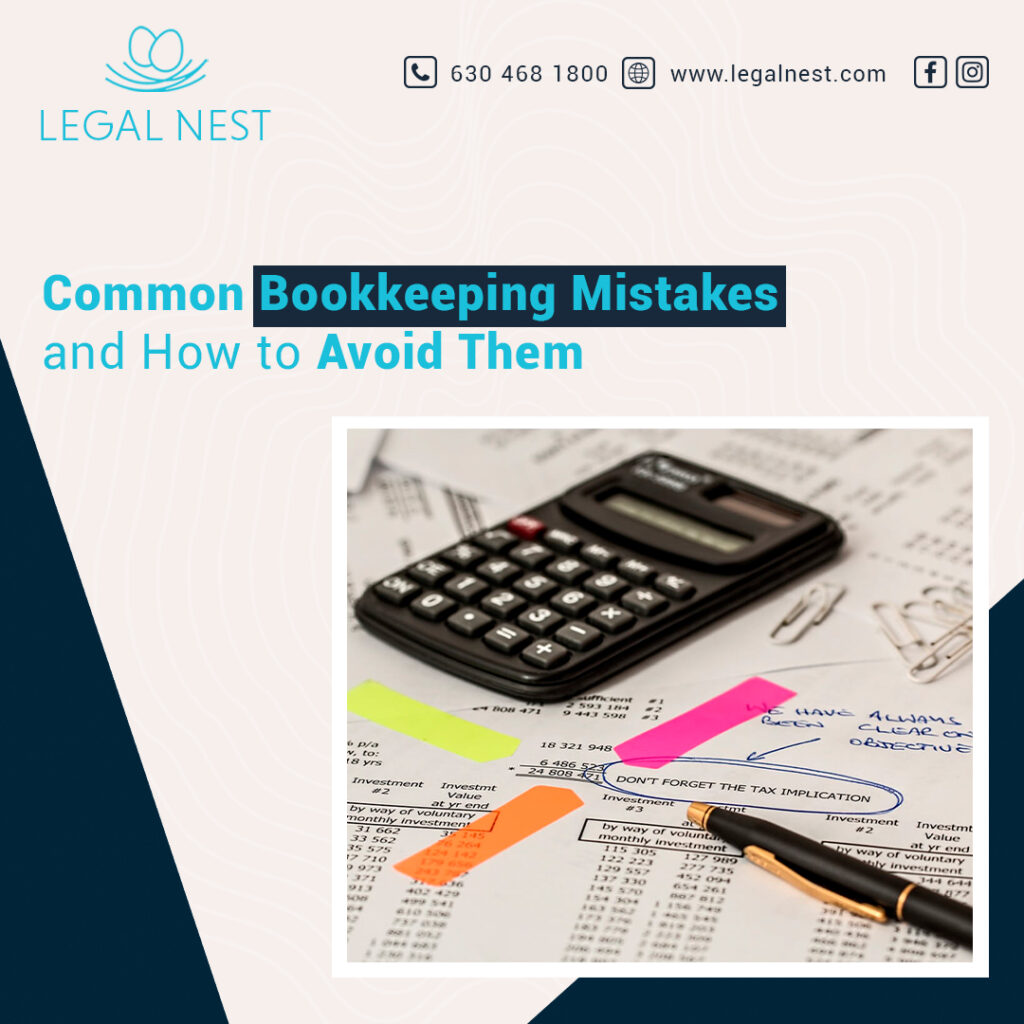Discover the most common bookkeeping mistakes and how to avoid them to maintain accurate books and financial stability for your business.
Top 10 Common Bookkeeping Mistakes Small Business Owners Make (and How to Avoid Them)
Elevate Your Business with Legal Nest: Bookkeeping Perfected, Business Thriving

Discover the most common bookkeeping mistakes and how to avoid them to maintain accurate books and financial stability for your business.
Top 10 Common Bookkeeping Mistakes Small Business Owners Make (and How to Avoid Them)
Elevate Your Business with Legal Nest: Bookkeeping Perfected, Business Thriving

Discover the most common bookkeeping mistakes and how to avoid them to maintain accurate books and financial stability for your business.
Common Bookkeeping Mistakes and How to Avoid Them
Top 10 Common Bookkeeping Mistakes Small Business Owners Make (and How to Avoid Them)
Accurate bookkeeping is crucial for the financial health of any business. However, many small businesses fall prey to common bookkeeping mistakes that can lead to significant issues down the road. Understanding and avoiding these errors is key to maintaining accurate books and ensuring your business’s success.
Mixing Personal and Business Finances
One of the most frequent bookkeeping mistakes is mixing personal and business finances. This can lead to confusion, inaccurate records, and potential tax issues. To avoid this, always keep separate bank accounts and credit cards for your business expenses. This separation makes it easier to track your business’s financial health and simplifies tax preparation.
Failing to Track Small Expenses
Small expenses can add up quickly and impact your business’s bottom line. Neglecting to record these costs can result in inaccurate financial statements. To prevent this, make it a habit to record every expense, no matter how minor. Utilize bookkeeping software or mobile apps that allow you to quickly log expenses on the go.
Not Reconciling Bank Accounts Regularly
Bank reconciliation is an essential task that ensures your records match your bank statements. Failing to reconcile your accounts regularly can lead to unnoticed discrepancies and errors. Schedule a time each month to reconcile your accounts, ensuring that all transactions are accounted for and correctly recorded.
Misclassifying Transactions
Incorrectly categorizing transactions can distort your financial reports and lead to poor decision-making. To avoid this bookkeeping pitfall, familiarize yourself with the different expense categories relevant to your business. If you’re unsure, consult with a bookkeeping professional to ensure transactions are classified correctly.
Ignoring Accounts Receivable and Payable
Neglecting to manage accounts receivable and payable can disrupt your cash flow and affect your business operations. Stay on top of invoicing customers promptly and follow up on overdue payments. Similarly, pay your bills on time to maintain good relationships with suppliers and avoid late fees.
Not Backing Up Financial Data
Losing financial data can be catastrophic for any business. Ensure that you regularly back up your bookkeeping records, either through cloud storage solutions or external hard drives. This practice protects your data from accidental loss or hardware failures.
DIY Bookkeeping Without Professional Help
While it’s tempting to handle bookkeeping yourself to save money, DIY bookkeeping can lead to costly mistakes. Consider hiring a professional bookkeeper or accountant who can provide expertise and ensure your books are accurate. This investment can save you time and prevent errors that could cost you more in the long run.
By avoiding these common bookkeeping mistakes, you can maintain accurate books and ensure the financial health of your business. Accurate bookkeeping not only helps in making informed business decisions but also keeps you prepared for tax season and potential audits.
Download your FREE Guide on How to Avoid the Common Bookkeeping Mistakes
Explore Related Resources: Discover More Articles You May Find Valuable.
Although bookkeeping is important, not every business owner wants or has time for it while expanding their business. Learn about why business owners outsource their bookkeeping.
Our dedicated team understands that one size does not fit all, which is why we work closely with you to understand your specific needs.
Unmanaged books can lead to more issues for you and your business. Learn more about the problems that can arise from poor bookkeeping habits.
Legal Nest
Expand Your Knowledge
Discover the Power of Bookkeeping and How It Can Benefit You. Visit Our Resource Center for Educational Tips and Insights. Click the “Educate Me” Button Below to Learn More




